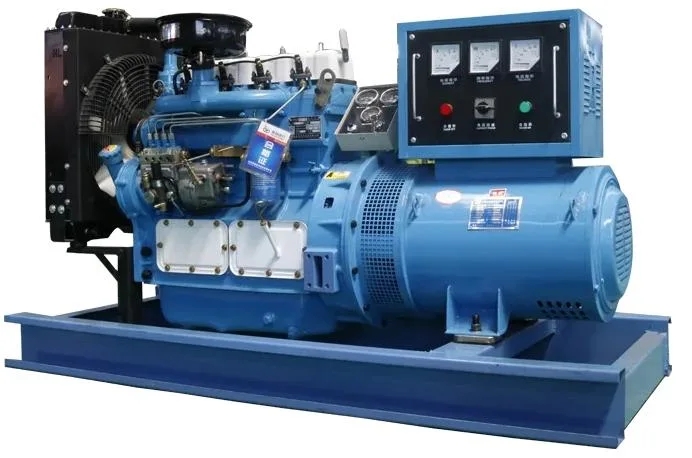Maximizing Efficiency and Reliability Diesel Generators for Factory Acceptance Testing
Introduction In the industrial world, factory acceptance testing (FAT) plays a crucial role in ensuring the quality and reliability of equipment before it is installed and commissioned. One of the key components essential for conducting successful FAT is a diesel generator. Diesel generators provide a reliable source of power that can ensure uninterrupted testing procedures, even in the event of power outages or grid failures. This article aims to explore the importance of diesel generators in factory acceptance testing, their key features, considerations for selection, and best practices for maximizing efficiency and reliability. Importance of Diesel Generators in Factory Acceptance Testing Factory acceptance testing is a critical step in the process of equipment procurement and installation in industrial settings. It involves verifying that the equipment meets the specified requirements and functions correctly before it is delivered to the end user's site. During FAT, various tests and simulations are conducted to assess the performance, safety, and reliability of the equipment under different operating conditions. One of the primary requirements for conducting successful FAT is a reliable source of power to ensure continuous operation of the equipment being tested. Power outages or interruptions can disrupt the testing process, leading to delays, additional costs, and potential risks to the equipment under evaluation. Diesel generators are widely used in FAT scenarios to provide backup power and ensure uninterrupted testing procedures. Key Features of Diesel Generators for FAT Diesel generators offer several key features that make them well-suited for factory acceptance testing applications. Some of the essential features include: 1. Reliability: Diesel generators are known for their robustness and reliability, making them a dependable source of backup power during FAT. They can start quickly and provide stable power output, ensuring continuous operation of the testing equipment. 2. Fuel Efficiency: Diesel generators are more fuel-efficient compared to other types of generators, making them a cost-effective choice for prolonged testing procedures. Their fuel consumption rate is relatively low, resulting in lower operational costs. 3. Power Output: Diesel generators are capable of delivering high power output, making them suitable for powering a wide range of equipment and machinery used in factory acceptance testing. They can handle both light and heavy loads, ensuring consistent performance under varying load conditions. 4. Durability: Diesel generators are designed to withstand harsh operating environments and heavy usage, making them ideal for industrial applications such as factory acceptance testing. They are built to last and require minimal maintenance, ensuring long-term reliability. Considerations for Selecting Diesel Generators for FAT When selecting a diesel generator for factory acceptance testing, several key considerations should be taken into account to ensure optimal performance and reliability. Some of the critical factors to consider include: 1. Power Requirements: Determine the power requirements of the equipment being tested to select a diesel generator with the appropriate power output capacity. Consider both the continuous and peak power demands to ensure the generator can meet the load requirements effectively. 2. Fuel Efficiency: Evaluate the fuel efficiency of the diesel generator to minimize operational costs during factory acceptance testing. Choose a generator with a low fuel consumption rate to reduce overall expenses associated with running the generator for extended periods. 3. Reliability and Durability: Prioritize reliability and durability when selecting a diesel generator for FAT. Opt for a reputable brand known for producing reliable generators that can withstand the rigors of industrial testing environments. 4. Emissions Compliance: Ensure that the diesel generator complies with local emissions regulations and environmental standards to minimize the impact on air quality and ensure regulatory compliance during testing procedures. Best Practices for Maximizing Efficiency and Reliability To maximize the efficiency and reliability of diesel generators used in factory acceptance testing, several best practices can be implemented. These practices aim to enhance performance, reduce downtime, and ensure smooth testing procedures. Some of the key best practices include: 1. Regular Maintenance: Implement a proactive maintenance schedule to keep the diesel generator in optimal condition. Perform 600kw diesel generator for remote energy projects , oil changes, filter replacements, and other maintenance tasks to prevent breakdowns and ensure reliable operation during FAT. 2. Load Testing: Conduct regular load testing on the diesel generator to verify its performance under varying load conditions. This practice helps identify potential issues and ensures that the generator can handle the power requirements of the equipment being tested. 3. Fuel Management: Monitor fuel levels regularly and ensure adequate fuel supply to avoid interruptions during factory acceptance testing. Implement fuel management systems to track fuel consumption and schedule refueling to maintain continuous operation of the generator. 4. Emergency Preparedness: Develop a comprehensive emergency preparedness plan that includes backup power sources, contingency measures, and response protocols in case of generator failure or power outage during FAT. Ensure that personnel are trained to handle emergencies effectively and minimize disruptions to testing procedures. Conclusion  Diesel generators play a vital role in ensuring the success of factory acceptance testing by providing a reliable source of backup power for testing equipment. Their reliability, fuel efficiency, power output, and durability make them well-suited for industrial applications where uninterrupted power supply is essential. By selecting the right diesel generator based on key considerations and implementing best practices for maintenance and operation, manufacturers can maximize efficiency and reliability during FAT, leading to successful equipment validation and commissioning processes.
Diesel generators play a vital role in ensuring the success of factory acceptance testing by providing a reliable source of backup power for testing equipment. Their reliability, fuel efficiency, power output, and durability make them well-suited for industrial applications where uninterrupted power supply is essential. By selecting the right diesel generator based on key considerations and implementing best practices for maintenance and operation, manufacturers can maximize efficiency and reliability during FAT, leading to successful equipment validation and commissioning processes.